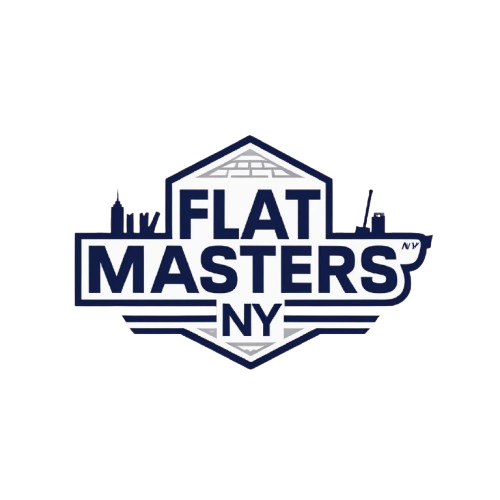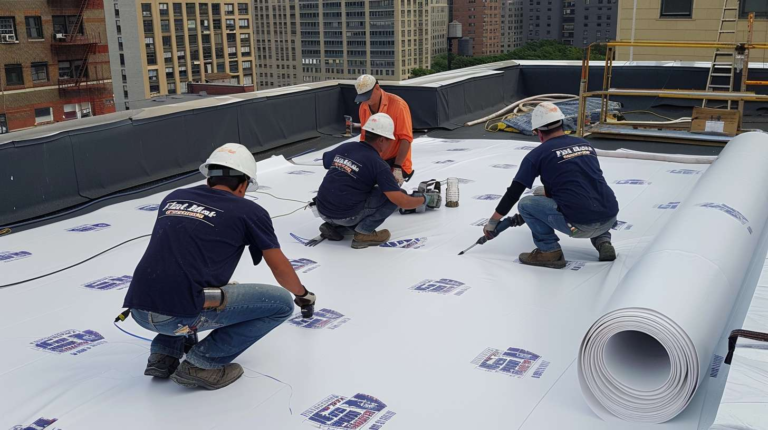Professional Flat Tar Roof Installation & Repair Services
Look, I've been installing and repairing flat tar roofs in Queens for over twenty years, and I can tell you straight up - they're still one of the most reliable roofing systems you can get, especially here where we deal with everything from nor'easters to those brutal summer heat waves. When people hear "tar roof," they sometimes think it's old-fashioned, but the truth is, modern built-up roofing systems using asphalt and modified bitumen are incredibly durable and cost-effective for flat applications.
Understanding Flat Tar Roof Systems
A flat tar roof isn't actually completely flat - we install them with a slight slope (usually 1/4 inch per foot minimum) to ensure proper drainage. The "tar" part refers to the asphalt-based materials we use to create multiple waterproof layers. These systems have been protecting buildings in New York City for decades, and there's a good reason why so many commercial and residential flat roofs in Queens still use this proven technology.
The basic construction involves alternating layers of roofing felt and hot asphalt or cold-applied adhesives, topped with a protective surface like gravel, mineral granules, or a reflective coating. We call this a built-up roof (BUR), and it creates what's essentially a waterproof membrane that can handle the freeze-thaw cycles we get here in the northeast.
Why Tar Flat Roofs Work So Well in Queens
Here's the thing about our climate - we get everything thrown at us. Last winter on a job in Astoria, I watched a tar flat roof we'd installed five years earlier handle three feet of snow followed by a sudden thaw with zero issues. The multi-layer construction means even if the top layer gets damaged, you've got backup protection underneath.
The thermal mass of these systems also helps with energy efficiency. During those August heat waves when temperatures hit 95°F, a properly installed tar roof with light-colored gravel can actually help keep your building cooler than some single-membrane systems.
Installation Process and Materials
When we install a new flat tar roof, the process typically takes 2-4 days depending on the size and complexity. We start by removing the old roofing material down to the deck, then inspect and repair any structural issues. The insulation goes down first - usually polyiso or mineral wool boards - followed by a vapor barrier if needed.
Then comes the fun part. We heat the asphalt to exactly 400-425°F (any hotter and you'll damage the felt, any cooler and it won't adhere properly) and apply it in thin, even coats between layers of reinforcing felt. Each layer gets embedded completely - no air pockets, no wrinkles. It's hot, messy work, but done right, it creates an incredibly durable roof.
The final surface depends on what you need. Gravel is traditional and provides excellent UV protection and fire resistance. Mineral granule surfaces give you more color options and are easier to walk on for maintenance. Some customers opt for aluminum coatings that reflect heat and extend the roof's life.
Maintenance and Longevity
A properly installed tar flat roof should last 20-30 years with regular maintenance. That means annual inspections, keeping drains clear, and addressing any small issues before they become big problems. I always tell my customers in Flushing and Jackson Heights - don't wait until you see water stains on your ceiling. By then, you're looking at interior damage on top of the roofing repairs.
The beauty of these systems is they're repairable. Small cracks or punctures can be patched with compatible materials. We can also resurface an aging tar roof by cleaning it thoroughly and applying new asphalt and surfacing materials, which costs much less than full replacement.
Common Issues and Solutions
Most problems I see with flat tar roofs come down to poor drainage or deferred maintenance. Queens gets about 45 inches of precipitation annually, and if water sits on your roof for more than 48 hours after a storm, you're asking for trouble. Ponding water will eventually find its way through even the best roof system.
Alligatoring - those surface cracks that look like reptile skin - is another common issue, usually caused by thermal stress or an aging asphalt surface. The good news is it's mostly cosmetic in early stages, but it tells us the roof is ready for a maintenance coat or resurfacing.
Oh, and here's something that drives me crazy - people walking on these roofs in high heels or with golf shoes. The gravel surface can handle normal foot traffic just fine, but sharp objects will puncture the membrane underneath. Always wear flat, soft-soled shoes when you need to go up there.
Cost Considerations
Installation costs for a flat tar roof typically run $8-12 per square foot for residential applications, including tear-off and disposal of old materials. Commercial jobs can vary more widely depending on access, building height, and specific requirements. The upfront cost might be higher than some single-ply systems, but the longevity and repairability often make it more economical over the roof's lifetime.
Repairs are usually straightforward and affordable - patching small areas might cost $300-600, while resurfacing a moderately-sized roof could run $3-5 per square foot.
Environmental and Code Considerations
New York has been pushing for more energy-efficient roofing, and modern tar flat roof systems can absolutely meet those requirements. We often install them with cool-roof coatings that meet Energy Star standards, and the thermal mass can actually help with temperature regulation inside the building.
Fire ratings are excellent - Class A with proper aggregates - which matters for insurance and building codes. The NYC Building Code has specific requirements for flat roof slopes and drainage that we always follow, plus we coordinate with the Department of Buildings for any required permits.
Why Choose Flat Masters NY
After installing hundreds of tar flat roofs across Queens, from single-family homes in Bayside to apartment buildings in Elmhurst, we've developed techniques and standards that ensure every job is done right the first time. My crew has been with me for years - they know these systems inside and out, and they take pride in their craftsmanship.
We use only premium materials from suppliers like Beacon Building Products on Northern Boulevard, and we stand behind our work with comprehensive warranties. More importantly, we're local - if you need service or have questions, you're not dealing with some corporate call center. You get me or one of my experienced foremen who actually worked on your roof.
Every flat tar roof installation includes a detailed maintenance plan and our commitment to annual inspections for the first three years. Because the best roof is one that never gives you problems, and that comes from proper installation and proactive care.


